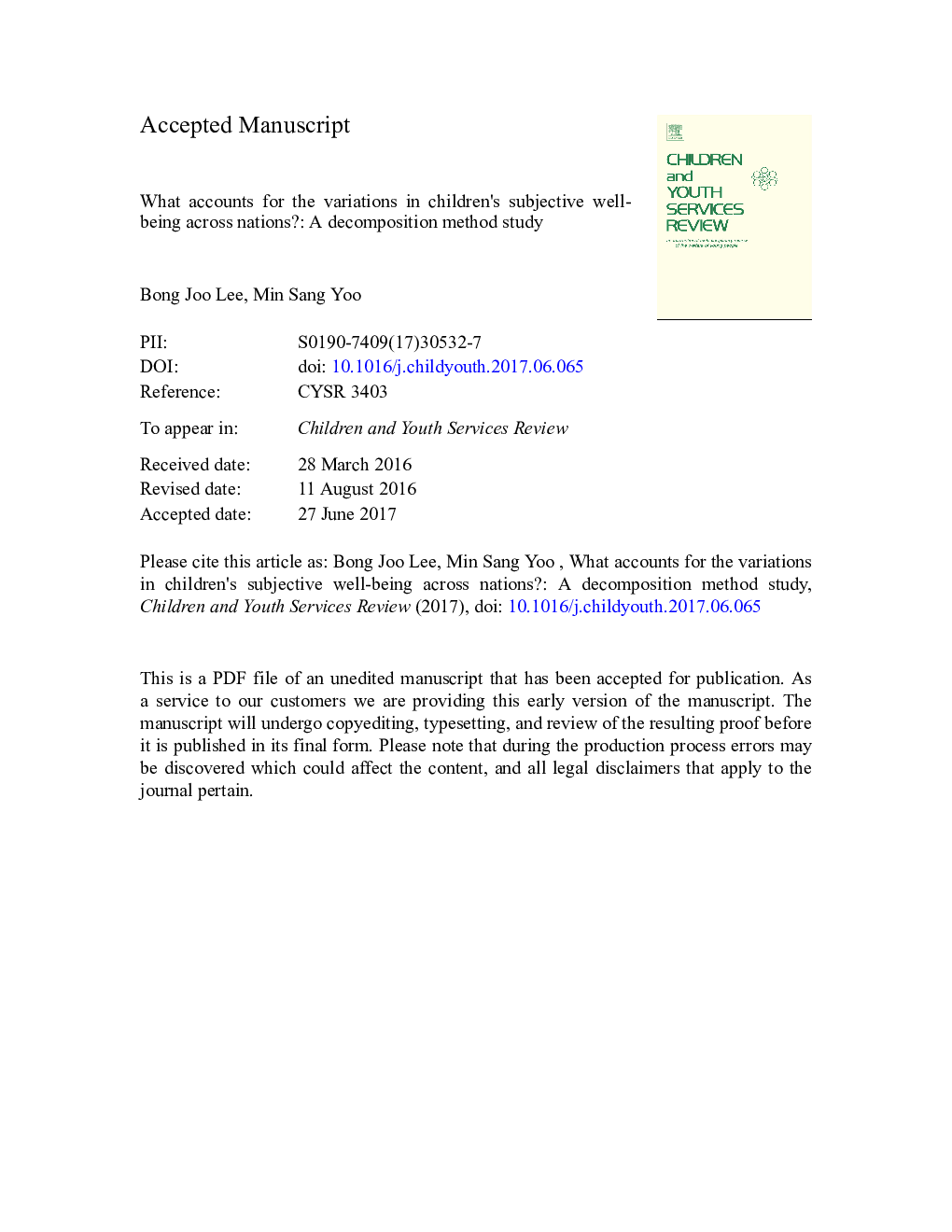| کد مقاله | کد نشریه | سال انتشار | مقاله انگلیسی | نسخه تمام متن |
|---|---|---|---|---|
| 4936219 | 1434429 | 2017 | 27 صفحه PDF | دانلود رایگان |
عنوان انگلیسی مقاله ISI
What accounts for the variations in children's subjective well-being across nations?: A decomposition method study
ترجمه فارسی عنوان
چه چیزی برای تغییرات در رفاه ذهنی کودکان در بین ملل وجود دارد؟: مطالعه روش تجزیه
دانلود مقاله + سفارش ترجمه
دانلود مقاله ISI انگلیسی
رایگان برای ایرانیان
کلمات کلیدی
رفاه ذهنی کودکان، کیفیت زندگی، رضایت از زندگی، روش تجزیه مطالعه تطبیقی، تعصب فرهنگی فرهنگی،
ترجمه چکیده
مطالعات نشان داده اند که تفاوت های مهمی در رفاه ذهنی کودکان در سراسر کشور وجود دارد. با این حال، دشوار است توضیح دهید که چرا این سطح در برخی کشورها پایین تر یا بالاتر است. با استفاده از داده های طرح کودکان جهان، این مطالعه به بررسی میزان سلامت ذهنی کودکان در سطح کشور می توان با عوامل مختلف اجتماعی و فرهنگی توضیح داد. به طور خاص، سطوح رفاه ذهنی کودکان کودکان را به هفت عامل که شناخته شده است برای سلامتی کودکان از جمله اوقات فراغت، محیط زیست، یادگیری، پول، رابطه، آزادی انتخاب و خود شناخته شده است، تجزیه می کنیم. پس از تجزیه، بخش غیر قابل توضیح (رهگیری و باقی مانده) برای هر کشوری به نظر می رسد که نشان دهنده بی اعتبار بودن گزارش های فرهنگی است. ما متوجه شدیم که تعصب گزارشگری فرهنگی نمیتواند همه واریانس را در رفاه ذهنی کودکان در سراسر کشورها توضیح دهد. در عوض، ما متوجه شدیم که آزادی انتخاب و خودمان دو عامل مهم است که سهم وسیعی از تنوع در سطح کلی رفاه ذهنی کودکان را در سراسر کشورها توضیح می دهد. این مقاله همچنین نتایج پیامدهای سیاست اجتماعی را فراهم می کند.
موضوعات مرتبط
علوم پزشکی و سلامت
پزشکی و دندانپزشکی
پریناتولوژی (پزشکی مادر و جنین)، طب اطفال و بهداشت کودک
چکیده انگلیسی
Studies have shown that there are important differences in children's subjective well-being across nations. However, it has been difficult to explain why this level is lower or higher in certain countries. Using data from the Children's Worlds project, this study examines how much of the country-level children's subjective well-being can be explained by various social and cultural contextual factors. More specifically, we decompose the levels of children's overall subjective well-being to seven factors that are known to be important for children's well-being including leisure, environment, learning, money, relationship, freedom to choose, and self. After the decomposition, the unexplained part (intercept and residual) for each country is considered to represent cultural reporting bias. We found that cultural reporting bias cannot explain all of the variances in children's subjective well-being across nations. Rather, we found that the freedom to choose and self are the two most important factors that explain vast share of the variances in the overall levels of children's subjective well-being across nations. The paper also provides social policy implications of the study results.
ناشر
Database: Elsevier - ScienceDirect (ساینس دایرکت)
Journal: Children and Youth Services Review - Volume 80, September 2017, Pages 15-21
Journal: Children and Youth Services Review - Volume 80, September 2017, Pages 15-21
نویسندگان
Bong Joo Lee, Min Sang Yoo,
